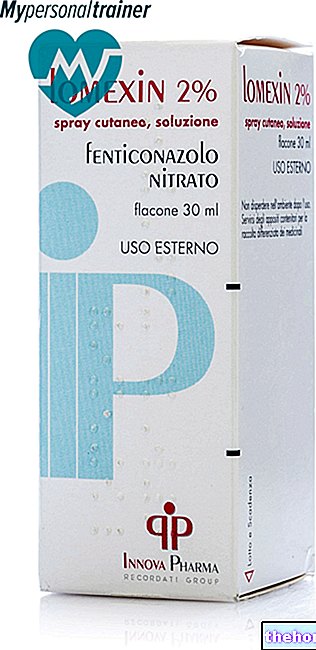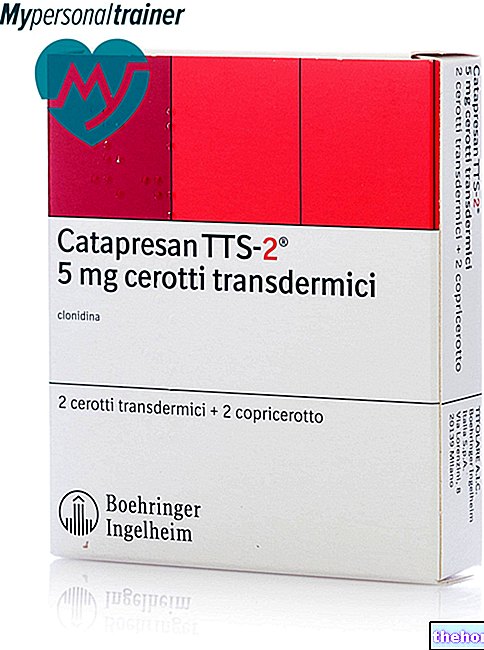Active ingredients: Isosorbide-5-mononitrate
Monoket 60 mg modified release tablets
Monoket package inserts are available for pack sizes:- Monoket 60 mg modified release tablets
- Monoket 50 mg prolonged-release hard capsules
- Monoket 20 mg tablets, Monoket 40 mg tablets
Indications Why is Monoket used? What is it for?
Monoket contains the active substance isosorbide-5-mononitrate, which belongs to a group of medicines called "organic nitrates".
"Organic nitrates" are vasodilator medicines used in heart disease, relax the blood vessels, facilitating the blood flow that brings nourishment to the heart.
Monoket is indicated:
- in the maintenance therapy of heart disease characterized by "obstruction of the coronary arteries, blood vessels that carry blood to the heart (coronary insufficiency);
- in the prevention of attacks of heart disease which manifests itself with chest pains (angina pectoris) which can also follow a heart attack, possibly accompanied by weakening of the heart (heart failure) also in combination with medicines capable of increasing the force of contraction of the heart (cardiotonics) and medicines used to treat high blood pressure (diuretics).
Monoket is not indicated for sudden attacks of chest pain (angina pectoris attacks).
Contraindications When Monoket should not be used
Do not take Monoket if:
- you are allergic to isosorbide-5-mononitrate, organic nitrates or any of the other ingredients of this medicine (listed in section 6);
- a heart attack is in progress;
- have a marked lowering of blood pressure (which can occur in many serious situations such as circulatory collapse, cardiogenic shock, hypovolemia);
- suffer from increased thickness of the heart muscle with obstruction to normal blood flow (hypertrophic obstructive cardiomyopathy);
- has a disease involving the lining of the heart, i.e. the pericardium (in particular, constrictive pericarditis, cardiac tamponade);
- suffer from increased blood pressure in the blood vessels of the lungs (primary pulmonary hypertension);
- you are taking medicines to treat erectile dysfunction (eg sildenafil, tadalafil, vardenafil) (see section "Other medicines and Monoket").
Precautions for use What you need to know before taking Monoket
Talk to your doctor before taking Monoket.
In particular, tell your doctor:
- if you suffer from eye disease caused by increased pressure of the fluid inside the eye (glaucoma);
- if you suffer from a severe reduction in hemoglobin in the blood, a substance that carries oxygen in the blood (marked anemia);
- if you suffer from an increase in the activity of a gland, known as the 'thyroid', which causes an increase in the blood of certain hormones called 'thyroid hormones' (hyperthyroidism);
- in case of head injuries (head trauma);
- in case of bleeding in the brain due to a rupture of a blood vessel (cerebral haemorrhage);
- if you suffer from a narrowing (stenosis) of a valve in your heart;
- if you suffer from low blood pressure following the sudden transition from sitting to standing (orthostatic hypotension);
- if you suffer from high blood pressure in the brain (intracranial hypertension);
- if you have kidney disease (kidney failure).
- if you suffer from slow intestinal transit and a reduced ability to push food through the intestine, as a reduction in the effect of the medicine may occur;
- If you suffer from diseases of the blood vessels of the heart (coranopathies), as there may be a shortage of oxygen in the heart due to an "abnormal decrease in the oxygen content in the blood (temporary hypoxemia).
Following high dose treatment and / or prolonged treatment:
- bluish discoloration of the skin and mucous membranes (cyanosis) may occur;
- you may experience a reduction or loss of the effect of this medicine. The reduction of the effect can also occur if you have been treated previously with another organic nitrate (medicine similar to Monoket).
IN ALL THESE CASES, CONSULT YOUR DOCTOR WHO WILL BE ABLE TO PRESCRIBE AN APPROPRIATE THERAPY.
Interactions Which drugs or foods can modify the effect of Monoket
Other medicines and Monoket
Tell your doctor or pharmacist if you are taking, have recently taken or might take any other medicines.
In particular, tell your doctor if you are taking the following medicines, as they may potentiate the hypotensive (low blood pressure) effect of Monoket:
- medicines that lower blood pressure (e.g. beta-blockers, vasodilators, diuretics, calcium channel blockers, ACE inhibitors);
- medicines for mental disorders and / or depression (neuroleptics and tricyclic antidepressants);
- medicines used in the treatment of erectile dysfunction (e.g. sildenafil, vardenafil and tadalafil). The simultaneous use of Monoket with these medicines can be life threatening.
Also tell your doctor if you are taking:
- dihydroergotamine (medicine used mainly to treat headaches), as concomitant administration with Monoket may increase blood levels and the effect of dihydroergotamine.
Monoket with food, drink and alcohol
Consumption of alcohol at the same time can alter the ability to react and reduce reflexes, therefore avoid the simultaneous use of alcohol (see section "Driving and using machines").
Warnings It is important to know that:
Pregnancy and breastfeeding
If you are pregnant, think you may be pregnant or are planning to have a baby, or if you are breast-feeding ask your doctor for advice before using this medicine, as there are no adequate studies in pregnant or breastfeeding women.
Driving and using machines
Monoket can impair the ability to react and reduce reflexes when driving vehicles and controlling machinery. This effect can be enhanced by the consumption of alcohol.
Monoket contains lactose
If you have been told by your doctor that you have an intolerance to some sugars (eg lactose), contact your doctor before taking this medicinal product.
Dosage and method of use How to use Monoket: Dosage
Always take this medicine exactly as your doctor or pharmacist has told you. If in doubt, consult your doctor.
The tablets should be taken with a little liquid, without chewing them; to facilitate ingestion, the tablet can be divided into 3 parts.
Unless otherwise prescribed, the recommended dose is 1 tablet in the morning.
If you experience a headache or low blood pressure, your doctor will instruct you to take lower doses at the start of therapy and will then increase the dose gradually.
If you have tight chest pain mostly in the morning, your doctor will prescribe you to take 2/3 tablet (40 mg) in the morning and 1/3 tablet (20 mg) in the evening.
Overdose What to do if you have taken too much Monoket
If you take more Monoket than you should
If you accidentally take too much Monoket you may experience the following symptoms:
- decrease in blood pressure (value less than and / or equal to 90 mmHg)
- pallor
- sweating
- weak throbbing
- increased heart rate (tachycardia)
- vertigo, including vertigo arising from standing upright
- headache (headache)
- weakness (asthenia)
- nausea
- He retched
- diarrhea
- drowsiness
- hot flashes
- increased levels of a substance in the blood called methemoglobin (methemoglobinemia) and a bluish discoloration of the skin and mucous membranes (cyanosis).
If you have swallowed / taken an overdose of Monoket, notify your doctor immediately or go to the nearest hospital.
If you forget to use Monoket
Do not take a double dose to make up for a forgotten tablet.
If you stop using Monoket
Contact your doctor immediately.
Side Effects What are the side effects of Monoket
Like all medicines, this medicine can cause side effects, although not everybody gets them. Compliance with the instructions contained in this leaflet reduces the risk of undesirable effects.
Very common (may affect more than 1 in 10 people)
- headache (headache). If you experience this effect, please tell your doctor, who may have you start therapy with increasing doses. The headache generally disappears during continued therapy.
Common (may affect up to 1 in 10 people)
- nausea.
At the beginning of treatment or with increasing doses, the following could occur:
- dizziness (including postural dizziness, which gets worse with position);
- drowsiness;
- increased heart rate (reflex tachycardia);
- lowering of blood pressure following the sudden transition from sitting to standing (orthostatic hypotension);
- weakness (asthenia), which generally disappears during continued therapy.
Uncommon (may affect up to 1 in 100 people)
- worsening chest pains (angina pectoris);
- severe decrease in blood pressure (circulatory collapse), sometimes accompanied by slow and irregular heartbeat (bradi-arrhythmia) and fainting (syncope);
- He retched;
- diarrhea;
- allergic skin reactions (eg rash);
- redness. If you experience this effect, please tell your doctor, who may have you start therapy with increasing doses.
Very rare (may affect up to 1 in 10,000 people)
- burning in the chest (heartburn);
- muscle pain (myalgia).
Not known (frequency cannot be estimated from the available data)
- low blood pressure (hypotension);
- inflammation of the skin with peeling of the skin (exfoliative dermatitis);
- reduction or loss of 'therapeutic effect' of this medicine or other organic nitrates (development of tolerance).
In addition, the following side effects may occur for which the frequency is not known.
Effects affecting the respiratory system
- condition in which the blood is not adequately oxygenated (temporary hypoxemia).
Effects affecting the heart
- "paradoxical effect" with aggravation of the heart condition (increased ischemia, increased damage, onset of decompensation, hypoxia);
- bluish discoloration of the skin and mucous membranes (cyanosis). This effect may be due to the increase in the blood of a substance called methemoglobin (methemoglobinemia).
Effects affecting the skin
- excessive sweating.
Effects affecting the blood vessels
- pallor;
- ischemia (reduced blood supply to an organ).
Effects affecting the nervous system
- agitation.
Reporting of side effects
If you get any side effects, talk to your doctor. This includes any possible side effects not listed in this leaflet. You can also report side effects directly via the national reporting system at www.agenziafarmaco.gov.it/it/responsabili. By reporting side effects you can help provide more information on the safety of this medicine.
Expiry and Retention
Keep this medicine out of the sight and reach of children.
This medicine does not require any special storage conditions.
Do not use this medicine after the expiry date which is stated on the carton after EXP. The expiry date refers to the last day of that month.
Do not throw any medicines via wastewater or household waste. Ask your pharmacist how to throw away medicines you no longer use. This will help protect the environment.
Composition and pharmaceutical form
What Monoket contains
- the active ingredient is: isosorbide-5-mononitrate 60 mg
- the other ingredients are: hypromellose, lactose, methylcellulose, macrogol, copolividone, colloidal anhydrous silica, magnesium stearate.
Description of what Monoket looks like and contents of the pack
Monoket 60 mg is presented in tablets packed in blister packs of 30 divisible tablets.
Source Package Leaflet: AIFA (Italian Medicines Agency). Content published in January 2016. The information present may not be up-to-date.
To have access to the most up-to-date version, it is advisable to access the AIFA (Italian Medicines Agency) website. Disclaimer and useful information.
01.0 NAME OF THE MEDICINAL PRODUCT
MONOKET 60 MG MODIFIED RELEASE TABLETS
02.0 QUALITATIVE AND QUANTITATIVE COMPOSITION
One tablet contains:
Active ingredient: Isosorbide-5-mononitrate 60 mg
Excipients: lactose
For the full list of excipients, see section 6.1
03.0 PHARMACEUTICAL FORM
Modified-release tablets.
04.0 CLINICAL INFORMATION
04.1 Therapeutic indications
Coronary insufficiency maintenance therapy, prevention of angina pectoris attacks. Post-myocardial infarction treatment and chronic myocardial insufficiency maintenance therapy, also in association with cardiotonics and diuretics.
Due to its pharmacological profile, MONOKET is not suitable for the control of acute stenocardial episodes.
04.2 Posology and method of administration
One tablet in the morning, unless otherwise prescribed.
The tablet must be taken without chewing, with a little liquid; to facilitate ingestion, the tablet can be divided into 3 parts.
In case of particular sensitivity of the patients it is possible to avoid the onset of headache or arterial hypotension by starting the treatment with 1/3 tablet (20 mg) or 2/3 (40 mg) and gradually increasing the dosage.
Subjects in whom anginal symptoms are prevalent during the morning hours can take 2/3 tablet (40 mg) in the morning and 1/3 (20 mg) in the evening.
04.3 Contraindications
Hypersensitivity to the active substance, to nitro derivatives or to any of the excipients.
• Myocardial infarction in the acute phase
• Acute circulatory failure (shock, circulatory collapse)
• Cardiogenic shock (unless sufficient tele-diastolic pressure is maintained by means of adequate measures)
• Severe arterial hypotension (systolic pressure
• Obstructive hypertrophic cardiomyopathy
• Constrictive pericarditis
• Severe hypovolaemia
• Cardiac tamponade
• Patients with primary pulmonary hypertension.
Phosphodiesterase inhibitors (sildenafil, vardenafil, tadalafil) potentiate the hypotensive effects of nitrates and, therefore, their co-administration with organic nitrates is contraindicated (see section 4.5).
Riociguat stimulates soluble guanylate cyclase and, therefore, co-administration with organic nitrates is contraindicated (see section 4.5).
04.4 Special warnings and appropriate precautions for use
MONOKET should be used with particular caution and under medical supervision in the following conditions:
• glaucoma
• marked anemia
• hyperthyroidism
• head trauma
• cerebral hemorrhage
• aortic or mitral stenosis
• subjects with a predisposition to orthostatic hypotension
• subjects with intracranial hypertension, although a further increase in blood pressure was observed only after taking intravenous doses of nitroglycerin
• patients with renal insufficiency.
The onset of the effect of MONOKET is not rapid enough to treat a
acute anginal attack.
MONOKET dilating the intracranial vessels, can cause, in the initial period of therapy, headache which, in sensitive subjects, can be severe and persistent; it can sometimes be prevented by administering lower doses in the first days of treatment (see section 4.2).
Temporary hypoxemia may occur during treatment with isosorbide mononitrate,
due to the relative redistribution of blood flow in hypoventilated alveolar areas. This can lead to myocardial hypoxia, particularly in patients with coronary artery disease (see section 4.8).
As with other vasodilators MONOKET can cause paradoxical effects in sensitive patients, these effects can increase ischaemia and also lead to extension of myocardial damage and advanced congestive heart failure.
If cyanosis occurs without intercurrent lung disease, the level of methemoglobin should be measured (methemoglobinemias occur more frequently during high dose treatments).
An increase in the dose and / or changes in the interval between doses may lead to attenuation or loss of efficacy.
Tolerance (reduced efficacy) and cross tolerance with other nitro derivatives (decreased effect in case of antecedent therapy with another organic nitrate) may occur. Prolonged high-dose therapy should be avoided to reduce or eliminate tolerance. Patients receiving MONOKET maintenance therapy should be advised that they should not use products containing phosphodiesterase inhibitors used in the treatment of erectile dysfunction (e.g. sildenafil, vardenafil, tadalafil).
MONOKET therapy should not be interrupted to take products containing phosphodiesterase inhibitors as this may increase the risk of an angina pectoris attack (see sections 4.3 and 4.5).
The concomitant intake of isosorbide mononitrate with calcium channel blockers may potentiate the hypotensive effect (see section 4.5).
Anginal attacks provoked as "rebound" of haemodynamic effects have been reported in clinical trials in patients with angina pectoris. It seems prudent, therefore, to gradually discontinue administration of the medicinal product when discontinuing therapy, especially in the case of high dose use.
The concomitant consumption of alcohol can increase the hypotensive effects of nitrates and reduce reflexes, for example when driving or controlling machinery that requires special attention.
The medicine contains lactose therefore patients with rare hereditary problems of galactose intolerance, lactase deficiency, or glucose-galactose malabsorption should not take this medicine.
Reduced release of the active substance may occur in patients with decreased gastrointestinal transit time using an extended release formulation of isosorbide mononitrate.
Keep this medicine out of the reach and sight of children
04.5 Interactions with other medicinal products and other forms of interaction
The simultaneous administration of drugs with hypotensive properties, (e.g. beta-blockers,
vasodilators, calcium channel blockers diuretics, ACE inhibitors), neuroleptics and tricyclic antidepressants can potentiate the hypotensive effect of isosorbide mononitrate.
Co-administration of phosphodiesterase inhibitors, (e.g. sildenafil, vardenafil and tadalafil)
used in the treatment of erectile dysfunction, potentiates the hypotensive effect of organic nitrates (see section 4.3).
This can lead to life-threatening cardiovascular complications; therefore in patients receiving MONOKET the use of phosphodiesterase inhibitors (eg sildenafil, vardenafil, tadalafil) is contraindicated.
Concomitant use of isosorbide mononitrate with Riociguat, a soluble guanylate cyclase stimulator, is contraindicated as it may cause hypotension.
Some reports suggest that concomitant administration of MONOKET may increase blood levels of dihydroergotamine and its effect.
Isosorbide mononitrate can act as a physiological antagonist of norepinephrine, acetylcholine, histamine, etc.
04.6 Pregnancy and lactation
Pregnancy
Reproduction studies conducted in rats and rabbits at doses up to maternal toxicity revealed no evidence of harm to the fetus due to isosorbide mononitrate. However, there are no adequate and well-controlled studies in women during pregnancy.
Since animal studies are not always predictive of response in humans, MONOKET can only be used in pregnancy if strictly necessary and under the prescription and continuous supervision of a doctor.
Feeding time
The available evidence is inadequate or inconclusive in determining the risk to the newborn when MONOKET is used during breastfeeding. There is data showing that nitrates are excreted in breast milk and can cause methemoglobinaemia in newborns. The extent of excretion. of isosorbide mononitrate and its metabolites in human milk has not been determined, therefore particular caution should be exercised when MONOKET is administered to breastfeeding women.
04.7 Effects on ability to drive and use machines
MONOKET can impair the ability to react and reduce reflexes when driving vehicles and controlling machines. This effect can be enhanced by the consumption of alcohol.
04.8 Undesirable effects
Most adverse reactions are attributable to pharmacodynamic activity and are dose dependent. Headache may occur at the start of treatment, which usually disappears with continued therapy. Hypotension and / or light-headedness on standing may be observed commonly (1-10% of patients) at initiation of therapy or with dose escalation. These symptoms may be associated with dizziness, drowsiness, reflex tachycardia and a sense of weakness and generally disappear during continued therapy.
The frequency of undesirable effects is defined using the following convention: very common (≥1 / 10), common (≥1 / 100,
(*) sometimes accompanied by bradi-arrhythmia and syncope
Temporary hypoxemia may occur during treatment with isosorbide mononitrate due to relative redistribution of blood flow to hypoventilated alveolar areas. This can lead to myocardial hypoxia, particularly in patients with coronary artery disease.
Severe hypotensive responses, including nausea, vomiting, agitation, paleness, and excessive sweating, have been reported with organic nitrates.
Reporting of suspected adverse reactions
Reporting of suspected adverse reactions occurring after authorization of the medicinal product is important as it allows continuous monitoring of the benefit / risk balance of the medicinal product. Healthcare professionals are asked to report any suspected adverse reactions via the national reporting system. "address" www.agenziafarmaco.gov.it/it/responsabili ".
04.9 Overdose
Symptoms:
• Blood pressure drop ≤ 90 mmHg
• Pallor
• Sweating
• Weak heartbeat
• Tachycardia
• Postural vertigo
• Headache
• Asthenia
• Vertigo
• Nausea
• He retched
• Diarrhea
• Sleepiness
• Flushing
• Methemoglobinaemia has been reported in patients receiving other organic nitrates. During the biotransformation of isosorbide mononitrate nitrite ions are released which can cause methemoglobinemia and cyanosis resulting in tachypnea, anxiety, loss of consciousness and cardiac arrest. It cannot be excluded that an overdose of isosorbide mononitrate may cause this adverse reaction.
• With very high dosages the intracranial pressure can be increased. This can involve cerebral symptoms.
Ordinary procedure:
• Stop taking the drug
• Ordinary procedures in case of nitro-derived hypotension
• The patient should be placed in a horizontal position with the head lowered and the legs raised
• Administration of oxygen
• Increased plasma volume (intravenous fluids)
• Specific anti-shock treatments (hospitalization of the patient in intensive care)
Special procedure:
• Try to increase blood pressure if it is very low
• Vasopressor agents should only be used in those patients who do not respond to "adequate fluid replacement."
• Treatment of methemoglobinemia: starting from a level of 0.8 g / 100 ml of methemoglobinemia, the treatment will consist of an intravenous administration of 1% methylene blue (1-2 mg / kg). In less severe cases, the dose of 50 mg / kg should be administered orally and treatment in a specialized center is recommended
• Resuscitation procedures
In case of signs of respiratory and circulatory arrest, start resuscitation procedures immediately.
05.0 PHARMACOLOGICAL PROPERTIES
05.1 Pharmacodynamic properties
Pharmacotherapeutic group: Organic nitrate with vasodilating action indicated in heart diseases. ATC code: C01DA14
Isosorbide-5-mononitrate, the active ingredient of the MONOKET specialty, is the main metabolite, in both animals and humans, of isosorbide dinitrate, a drug widely used for the treatment of coronary insufficiency. From a pharmacodynamic point of view. the "isosorbide-5-mononitrate, as well as the parent substance isosorbide dinitrate, has a" direct relaxing action on the vascular smooth muscle. Through a "direct action on the peripheral venous wall there is a venous vasodilation, with a seizure of blood (pooling) as happens for a bloodletting. Cardiac activity is also indirectly improved: decreased end-diastolic ventricular filling and therefore a fall in end-diastolic ventricular pressure, resulting in improved pump function and reduced oxygen consumption. In addition, coronary anastomoses have a better degree of filling during the diastolic phase and there is a better redistribution of the flow at the subendocardial level, the most sensitive site of the ischemic episode. To the main action on the venous capacitance (reduction of the venous return and therefore of the myocardial "preload") is added an "action on the arterial part of the circulation which, overall, is defined as a drop in" after-load " Both mechanisms are responsible for the antianginal effect of isosorbide -5-mononitrate and also for the favorable effects in heart failure. Coronary dilatation mainly concerns the large branches of the coronary arteries, so no "steal effect" is reached but rather a favorable redistribution of myocardial blood supply, with preference for ischemic areas.
05.2 Pharmacokinetic properties
Isosorbide-5-mononitrate is rapidly and completely absorbed from the gastrointestinal tract after oral administration without presenting, unlike isosorbide dinitrate, any hepatic "first pass" effect.
Administration of MONOKET 60 mg determines average plasma concentrations characterized by a gradual absorption pattern with reaching Tmax approximately 6 hours after administration, typical of the regulated release form.
Isosorbide-5-mononitrate is eliminated primarily in the urine as glucuronate.
05.3 Preclinical safety data
Acute toxicity: LD50 (rat): i.v. 2044 mg / kg; os 1965 mg / kg; LD50 (mouse): i.v. 2479 mg / kg; os 2581 mg / kg.
Subacute toxicity: "Beagle" dog per os (14 days): 50, 150, 450 mg / kg. At the first two dosages no toxic phenomenon. Only at the higher dose were signs of toxicity noted: ataxia, collapse, inhibition of motor activity, tachycardia.
Chronic toxicity: "Beagle" dog per os (52 weeks): 30, 90, 270 mg / kg. No intolerance phenomena were observed with the lowest dosage. The minimum toxic dose is estimated around 90 mg / kg. Oral rat (78 weeks): 30, 90, 270 mg / kg. Low and medium dosages were well tolerated. The initial high dosage (270 mg / kg) was also well tolerated: after the increase to 405 mg / kg the first slight toxic effects were found starting from week 27. The minimum toxic dose is estimated around 405 mg / kg .
Teratogenesis and fetal toxicity: Rat per os from the 6th to the 15th day of pregnancy: 90, 270, 540 mg / kg. Minimum toxic dose for the fetus: over 540 mg / kg. Minimum toxic dose for the mother: below 540 mg / kg. Rabbit per os from the 6th to the 18th day of pregnancy: 270, 810, 2430 mg / kg. Results referred to the mothers: at the low dose no alteration, at the intermediate dose decrease in body weight; the higher dosage falls within the lethality range. Results referred to fetuses: at 270 and 810 mg / kg no influence on prenatal development was noted. One fetus died at the lowest dosage, 4 to 810 mg / kg from spontaneous death, 3 deaths in controls.
Peri and postnatal toxicity: Rat per os from day 16 of gestation to day 21 of lactation: 90, 270, 540 mg / kg. The lower dosages were well tolerated. At the highest dosage signs of toxicity although "the duration of pregnancy was normal and the births spontaneous.
Influence on fertility and reproductive function. Rat per os: 40, 120, 360 mg / kg. The minimum toxic dose for parent animals, their fetuses and young animals is to be found between 120 and 360 mg / kg.
Mutagenicity: Ames test (in vitro) on Salmonella typhimurium: no mutagenic effect was observed. Chromosomal aberration test (in vivo) on Chinese hamster: doses used: 430.17 and 860.33 mg / kg; no mutagenic effect was observed. Sister chromatid exchanges induction test on Chinese hamster: doses used: 430.17 and 860.33 mg / kg, no mutagenic effect was observed.
06.0 PHARMACEUTICAL INFORMATION
06.1 Excipients
Hypromellose, Lactose, Methylcellulose, Macrogol, Copolividone, Silica, colloidal anhydrous, Magnesium stearate.
06.2 Incompatibility
None.
06.3 Period of validity
3 years.
06.4 Special precautions for storage
This medicinal product does not require any special storage conditions
06.5 Nature of the immediate packaging and contents of the package
Inner packaging: opaque blister. External packaging: printed cardboard box.
Box of 30 divisible tablets
06.6 Instructions for use and handling
No special instructions.
07.0 MARKETING AUTHORIZATION HOLDER
CHIESI FARMACEUTICI S.p.A., Via Palermo 26 / A - Parma
08.0 MARKETING AUTHORIZATION NUMBER
025200041
09.0 DATE OF FIRST AUTHORIZATION OR RENEWAL OF THE AUTHORIZATION
13/02/1993
10.0 DATE OF REVISION OF THE TEXT
November 2015




























